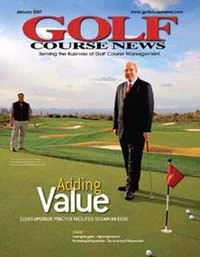A vicious circle can be defined as when one thing leads to another thing and then the other thing reverts back to the one thing. Unfortunately, the GCSAA election process offers one of the better examples of how a vicious circle can undermine effective governance. Over 99 percent of all eligible votes within GCSAA national elections are accumulated by chapters in blocks, which are then used as tradable chips in upcoming elections. This happens because Article I of the association bylaws empowers the board to define the standing rules for membership, which states “a member’s vote will automatically be assigned to the chapter unless the individual member indicates on an appropriate form that he/she wishes to vote as an individual.”
Left standing, this defaulting election policy will continue to increase the number of indifferent, uninformed members while at the same time discouraging natural leaders within the membership from seeking board/committee service.
The obvious way to move away from chapter block voting would be to allow members to vote as individuals directly to the GCSAA via the Internet where:
(i) eligible voters could gain access to a computerized election process via their unique member ID numbers; and (ii) safety protocols would prevent members from voting more than once on any single issue.
This would appear to be the perfect solution to a serious problem. However, when elected association leaders are canvassed by interested parties – including myself – about this matter, they consistently state or imply that because members generally are indifferent to, and therefore not adequately informed about basic election issues, they can’t be trusted to vote.
There it is, the vicious circle: Individual members shouldn’t be given the opportunity to vote because they’re uninformed. But they’re uninformed because the chapter block voting process dictates this. The obvious solution to this dilemma would be to educate GCSAA members about election issues via the Internet and chapter town hall meetings and then allow them to vote electronically as individuals directly to the GCSAA. But this isn’t about to happen because it’s apparent that elected GCSAA and chapter leaders don’t want members voting as individuals.
Checks and balances
Sound, election-based government requires a system of checks and balances to insure conflicts of interest don’t permeate and undermine government. The best example illustrating this premise is the three branches of the U.S. federal government. Imagine how the federal government would function if the executive branch served alone, without the counter-balancing influence of the legislative and judicial branches? The office of the president would become a dictatorship, and the country would be diminished accordingly.
Similarly, it should be noted the GCSAA bylaws virtually are void of any system of checks and balances and the association is indeed being diminished accordingly. For example:
1. Article V assures that chapter delegates will cast all votes for their chapter members in GCSAA elections – an approach that bypasses individual member voting, which is the very cornerstone of a system of checks and balances.
2. Article VII grants the board of directors the sole power to appoint all members of the nominating committee. Regrettably, this: (i) fosters board secrecy because those with contrary thinking are denied board access; (ii) denies the membership the opportunity to hold the board accountable because member issue-voting can be/has been denied indefinitely; and (iii) creates a serious conflict of interest because the nominating committee, along with politically appointed past presidents and members at large, serve as the board oversight task force every third year, i.e., the board is basically reviewing itself.
3. Article VII solely authorizes the president to establish all standing committees of the association and to appoint all members to each of these policy-setting committees – an approach that basically positions the president as a monarch or dictator, depending on which side of the political fence you reside.
To be fair and accurate, recent GCSAA boards of directors can’t be held responsible for putting these lax bylaws in place. The onerous policies contained within these bylaws were established many years ago. Clearly though, it’s time to revisit this situation now.
The obvious solution to addressing these lax mandates would be to amend the bylaws. However, this is an almost impossible task because a mandatory two-thirds member voting approval is required to amend the bylaws and the articles of incorporation. (See my November 2005 column.)
Against this backdrop of bylaws lacking any semblance of checks and balances, it’s time to sample membership opinion on a key democratic issue, i.e., would the members prefer to vote in GCSAA elections as individuals, or default their votes to chapters to vote for them?
Accordingly, all classes of GCSAA members are invited to participate in this straw poll electronically (a yes or no vote) as indicated in the box below. Results will be published in a forthcoming issue. Granted, this is a nonscientific poll asking voting ineligible GCSAA members to participate, but I’m seeking the widest possible sampling of informal membership opinion at this time.
Like it or not, this straw poll will serve as a referendum to measure member indifference to voting opportunity. Light member participation will advance the premise that GCSAA members can’t be trusted to vote because they don’t care enough to be informed. Clearly, the GCSAA bylaws need to be revised to reflect a more democratic process if the association is going to have any chance of effectively leading/serving its members in a demanding 21st century. To the best of my knowledge, this is the first time the GCSAA membership has been invited to provide a collective opinion about an associationwide issue. Cast your ballot as you like, but don’t blow the opportunity. There might not be another. GCN
Jim McLoughlin is the founder of TMG Golf (www.TMGgolfcounsel.com), a golf course development and consulting firm, and is a former executive director of the GCSAA. He can be reached at golfguide@adelphia.net or 760-804-7339. His previous columns can be found on www.golfcoursenews.com.

Explore the January 2007 Issue
Check out more from this issue and find your next story to read.
Latest from Golf Course Industry
- The Cabot Collection announces move into course management
- Carolinas GCSA raises nearly $300,000 for research
- Advanced Turf Solutions’ Scott Lund expands role
- South Carolina’s Tidewater Golf Club completes renovation project
- SePRO to host webinar on plant growth regulators
- Turfco introduces riding applicator
- From the publisher’s pen: The golf guilt trip
- Bob Farren lands Carolinas GCSA highest honor






